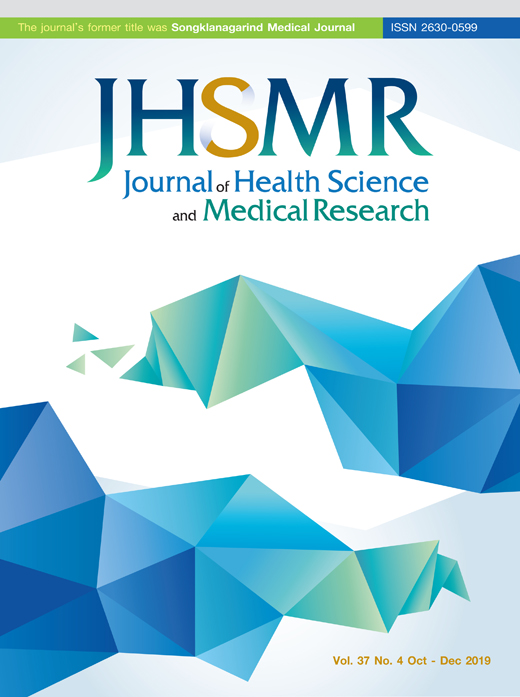Serum Sodium Levels Predict the Recurrence of Febrile Seizure within 24 Hours
DOI:
https://doi.org/10.31584/jhsmr.201961Keywords:
febrile seizures, recurrence febrile seizures, serum sodium levels, simple febrile seizureAbstract
Objective: Febrile seizure is a common disorder in children that occurs in 2.5% of children 6-60 months of age. The study was conducted to ascertain the role of serum sodium as a predictor of seizure recurrence within the same febrile illness.
Material and Methods: A retrospective study was conducted in children with febrile seizures who were admitted to Kaengkhro Hospital between 1 January 2014 and 31 December 2017. The data collected from medical records included age, gender, serum sodium level, body temperature, duration of fever, and family history of febrile seizures.
Results: Two hundred ten children were diagnosed with febrile seizures; 190 had a single febrile seizure and 20 had recurrent febrile seizures. Mean±standard deviation ages of children with a single febrile seizure and recurrent febrile seizures were 22.95 ± 0.95 and 22.34 ± 0.89 months, respectively. Serum sodium levels in children with recurrent seizures within 24 hours (130.80 mmol/L) were significantly lower than in children with a single febrile seizure (132.37 mmol/L, p-value=0.02). A family history of febrile seizures was significant for predicting recurrent seizures within 24 hours (p−value= 0.006).
Conclusion: Serum sodium levels predict the recurrence of febrile seizure within 24 hours.
References
2. Steering Committee on Quality Improvement and Management, Subcommittee on febrile Seizures. American Academy of Pediatrics. Febrile seizure: clinical practice guideline for the long−term management of the child with simple febrile seizure. Pediatrics 2008;121:1281-6.
3. Waruiru C, Appleton R, Febrile seizures: an update. Arch Dis Child 2004:89:751-6.
4. Rutter N, O’Callaghan MJ. Hyponatraemia in children with febrile convulsions. Arch dis Child 1978;53:85-7.
5. Kiviranta T, Airaksinen EM. Low sodium levels in serum are associated with subsequent febrile seizures. Acta Paediatr 1995;84:1372−4.
6. Hugen CA, Oudesluys-Murphy AM, Hop WC. Serum sodium levels and probability of recurrent febrile seizures. Eur J Pediatr 1995;154:403-5.
7. Kulandaivel M. Serum sodium levels and probability of recurrent febrile convulsions. Int J sci Stud 2017;5:5-8.
8. Thoman JE, Duffner PK, Shucard JL. Do serum sodium levels predict febrile seizure recurrence within 24 hours? Pediatr Neurol 2004;31:342-4.
9. Heydarian F, Ashrafzadeh F, Kam S. Simple febrile seziures: the role of serum sodium levels in prediction of seizure recurrence during the first 24 hours. Iran J Child Neurol 2009;3:31-4.
10. Nadkarni J, Binaykiya I, Sharma U, Dwivedi R. Role of serum sodium levels in prediction of seizure recurrence within the same febrile illness. Neurol Asia 2011;16:195-7.
11. Maksikharin A, Prommalikit O. Paediatr Int Child Heath 2015;35:44-6.
12. Stanley FL. Reference intervals for laboratory yests and procedures. In: Kliegman RM, Stanton BF, Schor NF, St Geme JW, editors. Nelson textbook of pediatrics. 20th ed. Philadelphia: Elsevier; 2016;p.3465t-72t.
13. Halawa I, Andersson T, Tomsom T. Hyponatremia and risk of seizures: a retrospective cross−sectional study. Epilepsia 2011;52:410-3.
14. Worawit K, Kamornwan K, Orawan L. Clinical characteristics of febrile seizures and risk factors of its recurrence in Chiang Mai University Hospital. Neurol Asia 2017;22:203-8.
15. Pavlidou E, Tzitiridou M, Kontopoulos E, Panteliadis CP. Which factors determine febrile seizure recurrence? A prospective study. Brain Dev 2008;30:7-13.
16. Usha KC, Suresh R. Reduced serum calcium is a risk factor for febrile seizures. Int J Contemp Pediatr 2017;4:1506-8.
























